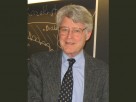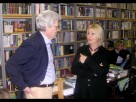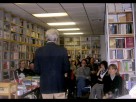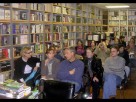Philip Pomper
Event Venue:
Russian Bookstore No. 21174 Fifth Ave (between 22nd and 23rd St)
Manhattan
Event Date:
February 9, 2010Lenin’s Brother
Tuesday, February 9, 2010, 6:30 PM
Philip Pomper was born in Chicago and attended the University of Chicago, where he specialized in modern European history and Russian history. He received his B.A in 1959, his M. A. in 1961, and his Ph.D. in 1965. He developed an early interest in revolutionary history. He wrote his master's thesis on peasant rebellions in the Russian empire in 1902. He then began focusing his studies on the revolutionary intelligentsia and wrote his doctoral thesis on Peter Lavrov, the narodnik theorist. While at Chicago he studied under Leopold Haimson. After a year (1962-63) studying at Moscow State University under the auspices of the cultural exchange between the U.S.A. and the Soviet Union, with the help of a Ford Foundation grant he did archival work in Amsterdam and further research and writing in New York City (1963-64). With the help of grants and fellowships, over the years he has worked on research projects in NYC, Cambridge, Mass., Washington, D. C., and Palo Alto, Calif., and in Russia and western Europe.
In 1964 he began teaching at Wesleyan University and will retire at the end of the current academic year, in June 2010. He plans to continue researching and writing after retiring from teaching.
He developed a lifelong interest in the Russian revolutionary movement and the Russian intelligentsia and a special interest in revolutionary terrorism. His publications, both books and articles, reflect this. At the same time, he became more interested in the biography of revolutionaries and added psychological approaches to his repertoire, thus acquiring the label "psychohistorian." The titles of his books and articles (the latter not included here) reflect these interests. He also became interested in theory and joined the editorial staff of the journal History and Theory in 1991. He has published articles for the journal and co-edited three books (not listed below) based on History and Theory projects.
His major contributions to Russian and intellectual history are:
The Russian Revolutionary Intelligentsia (1970)
Peter Lavrov and the Russian Revolutionary Movement (1973)
Sergei Nechaev (1979)
The Structure of Mind in History (1985)
Trotsky's Notebooks, 1933-35: Writings on Lenin, Dialectics, and Evolutionism (1986)
Lenin, Trotsky, and Stalin: The Intelligentsia and Power (1990)
Lenin's Brother: The Origins of the October Revolution (2010)
In Lenin's Brother, Philip Pomper traces the life and ultimate death (by hanging) of Alexander Ulyanov, Lenin's older brother. In 1887, decades before the October Revolution, Alexander Ulyanov led a group of fellow students at St. Petersburg University in an attempt to assassinate the tsar. This step towards revolution, terrorism and change powerfully influenced Vladimir Ulyanov and was pivotal in his transformation into the legendary "Lenin". In examining the psychology of the Ulyanov household as well as of the St. Petersburg students, Pomper provides a fresh insight into the background history of "the most important revolutionary of the twentieth century."





